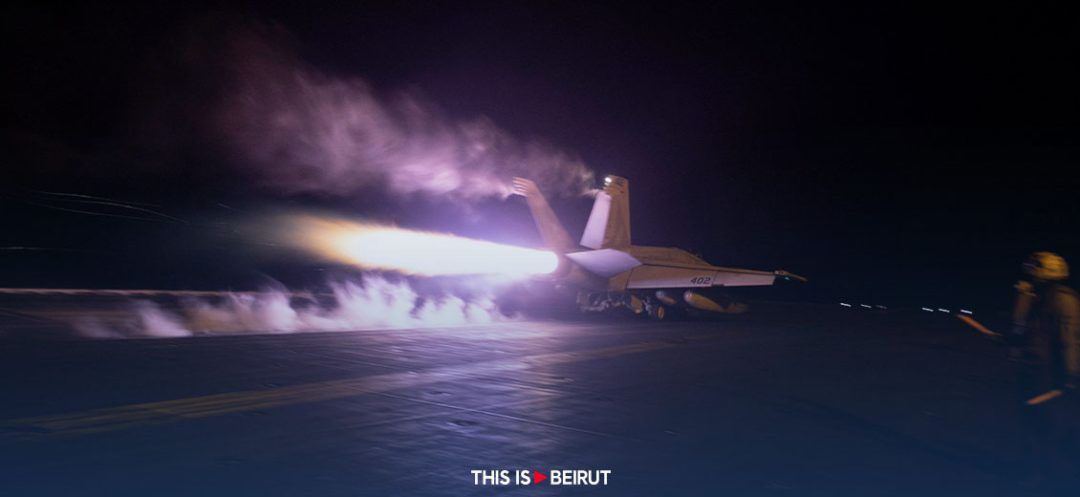- Home
- War in the Middle East
- New US & UK Strikes on Houthis, Who Warn About Retaliation

©(CENTCOM, AFP)
The US and UK carried out new strikes against Houthi bases in Yemen on Monday evening, January 22. The group announced that it would retaliate the following day.
American and UK forces struck Houthi targets on Monday, their second round of joint military action after a first wave of strikes against the rebel group earlier this month.
On Tuesday, Britain vowed to keep hampering the ability of Yemen's Houthis to attack Red Sea shipping, following the latest joint-US strikes on the Iran-backed group.
"Since we last took action 10 days ago, there have been over 12 attacks on shipping by the Houthis in the Red Sea," Foreign Minister David Cameron told broadcasters.
"These attacks are illegal. They are unacceptable."
"What we have done again is send the clearest possible message that we will continue to degrade their ability to carry out these attacks... (and) that we back our words and our warnings with action," he added.
[readmore url="https://thisisbeirut.com.lb/world/217715"]
The latest US-UK strikes were against "eight Houthi targets in Yemen in response to the Houthis' continued attacks on international and commercial shipping as well as naval vessels transiting the Red Sea," Washington and London said in a joint statement with other countries that supported the military action.
"These precision strikes are intended to disrupt and degrade the capabilities that the Houthis use to threaten global trade and the lives of innocent mariners," the statement said.
Since the first joint strikes, the United States has also launched individual air raids against missiles that Washington said posed imminent threats to both civilian and military vessels.
[readmore url="https://thisisbeirut.com.lb/world/216980"]
But the Houthis have vowed to continue their attacks – just one part of a growing crisis in the Middle East linked to the Israel-Hamas war, which has raised tensions across the region as well as fears of a broader war directly involving Iran.
The Houthis warned on Tuesday that the US, UK strikes would not go "unanswered and unpunished."
With AFP
American and UK forces struck Houthi targets on Monday, their second round of joint military action after a first wave of strikes against the rebel group earlier this month.
On Tuesday, Britain vowed to keep hampering the ability of Yemen's Houthis to attack Red Sea shipping, following the latest joint-US strikes on the Iran-backed group.
"Since we last took action 10 days ago, there have been over 12 attacks on shipping by the Houthis in the Red Sea," Foreign Minister David Cameron told broadcasters.
"These attacks are illegal. They are unacceptable."
"What we have done again is send the clearest possible message that we will continue to degrade their ability to carry out these attacks... (and) that we back our words and our warnings with action," he added.
[readmore url="https://thisisbeirut.com.lb/world/217715"]
The latest US-UK strikes were against "eight Houthi targets in Yemen in response to the Houthis' continued attacks on international and commercial shipping as well as naval vessels transiting the Red Sea," Washington and London said in a joint statement with other countries that supported the military action.
"These precision strikes are intended to disrupt and degrade the capabilities that the Houthis use to threaten global trade and the lives of innocent mariners," the statement said.
Since the first joint strikes, the United States has also launched individual air raids against missiles that Washington said posed imminent threats to both civilian and military vessels.
[readmore url="https://thisisbeirut.com.lb/world/216980"]
But the Houthis have vowed to continue their attacks – just one part of a growing crisis in the Middle East linked to the Israel-Hamas war, which has raised tensions across the region as well as fears of a broader war directly involving Iran.
The Houthis warned on Tuesday that the US, UK strikes would not go "unanswered and unpunished."
With AFP
Read more



Comments